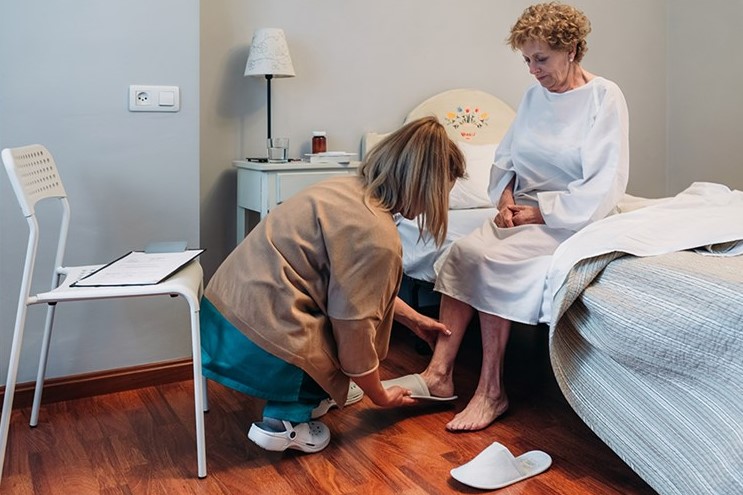The terms “personal home care assistance” and “caregiver” are often used interchangeably, but they actually refer to two different types of care. Personal care assistants provide basic assistance with activities of daily living, while caregivers can provide both basic and medical care. So, what’s the difference between a personal care assistant and a caregiver? Keep reading to find out.
What is a personal care assistant?
A personal care assistant (PCA) is a health care professional who provides direct care to patients in their homes. PCAs help patients with activities of daily living such as bathing, dressing, eating, and toileting. They also provide companionship and emotional support to patients and their families.
PCAs are usually employed by home health agencies, but they may also be self-employed. The majority of PCAs are certified through a state-approved training program. Some states require certification, while others do not.
PCAs play a vital role in the lives of their patients and their families. They provide essential services that allow patients to remain in their homes and maintain their independence.
What is a caregiver?
The term caregiver is used to describe an individual who provides care and assistance to another person. The care that a caregiver provides can be physical, emotional, or both.
A caregiver is often someone who is close to the person in need of care, such as a family member or friend. However, caregivers can also be professional caregivers who are trained to provide specific types of care.
Caregivers typically perform tasks that help the person they are caring for to maintain their health and well-being. This can include providing transportation to doctor’s appointments, helping with activities of daily living such as bathing and dressing, and providing companionship.
The difference between a personal care assistant and caregiver
There are many differences between a personal care assistant (PCA) and a caregiver. A PCA is a trained professional who provides in-home health care services to patients. They are usually hired by home health agencies or nursing homes. Caregivers, on the other hand, are usually family members or friends of the patient who provide them with day-to-day care.
PCAs are typically required to have at least a high school diploma or equivalent, although some states may require additional training or certification. They must also pass a background check and be able to lift at least 25 pounds. In contrast, there are no formal education or training requirements for caregivers.
PCAs can perform a variety of tasks, including bathing, dressing, and grooming; transferring and ambulating; toileting and incontinence care; meal preparation and feeding; and providing transportation to doctor’s appointments and other errands. Caregivers may also provide these same services, but they may not have the same level of training or experience as a PCA.
Another key difference between a PCA and a caregiver is that PCAs are typically paid for their services, while caregivers are not. This is because most caregivers are family members or friends of the patient who do not want to be compensated for their time and effort. However, some families may choose to pay their caregivers for their help.
The duties of a personal care assistant
A personal care assistant (PCA) is a specially trained individual who provides support and assistance to people with physical disabilities or chronic health conditions.
The duties of a PCA vary depending on the needs of the individual they are supporting but may include tasks such as providing personal care (e.g. bathing, dressing), helping with household chores, preparing meals, transportation, and providing companionship.
PCAs are required to have completed a certified training program and must maintain up-to-date First Aid and CPR certification. In some states, PCAs may also be required to have a background check and/or fingerprinting done.
The duties of a caregiver
There are many duties that a caregiver may be responsible for, depending on the needs of the person they are caring for. These can include providing personal care such as bathing, dressing, and grooming; helping with activities of daily living such as eating, toileting, and exercise; providing transportation to appointments or errands; and offering companionship. In addition, caregivers may also be responsible for managing medications, providing light housekeeping and laundry assistance, and helping with financial and medical paperwork.
Which one should you hire?
There is no easy answer when it comes to hiring a personal care assistant (PCA) or caregiver. Both provide important services that can improve your quality of life, but there are some key differences to consider.
PCAs help with activities of daily living, such as bathing, dressing, and grooming. They also provide light housekeeping and cooking services. Caregivers, on the other hand, may provide more comprehensive care, including assistance with medical appointments and medications, as well as help around the house.
The best way to decide which type of professional to hire is to assess your needs and match them with the skills of the potential employee. If you need regular assistance with activities of daily living and light housekeeping tasks, a PCA may be a good fit. However, if you require more comprehensive care, a caregiver may be a better option.
Conclusion
There is a lot of confusion surrounding the terms “personal care assistant” and “caregiver.” Both terms are used to describe someone who provides care for another person, but there are some key differences between the two. A personal care assistant typically works in a home setting, whereas a caregiver may work in a variety of settings including hospitals, nursing homes, and private residences. Personal care assistants usually have more training than caregivers and are required to complete certain tasks such as bathing, dressing, and grooming their clients. Caregivers, on the other hand, may provide both physical and emotional support to their clients. Ultimately, the term you use to describe someone who provides care for another person depends on the individual situation.


